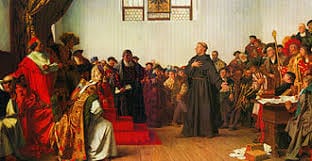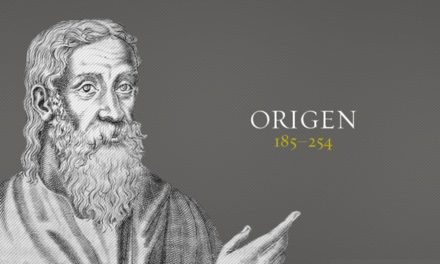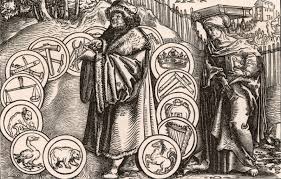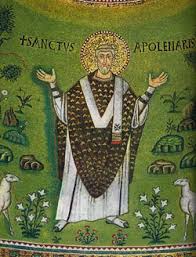Since we’re rapidly approaching the 500th Anniversary of the Reformation, we begin a short series on it’s beginning.
Most would do so with the career of Martin Luther. But as long time CS subscribers know, I usually buck the trend and do something else. à Why disappoint?
So we begin with a look at another monumental figure of history that just so happened to be in that room that day at Worms when Luther was on trial for his ideas and writings.
He’s known to history as Holy Roman Emperor — Charles V.
Charles was born in 1500, the eldest son of Philip the Handsome and Joanna of Castile. This was right at that time in European history when in world history class, we all gave up trying to sort out how the kings and queens of one region became the rulers of others. Suffice it to say Charles ended up inheriting the rule of a vast swath of the European countryside in western, central, and southern Europe, as well as the Spanish colonies in the New World and Asia. His domains spanned some 4 million square kms / over 1.5 million mls. While we oftern refer to the British Empire as that on which the sun never set, that accolade was first attached to Spain’s Empire under Charles V.
He became king of the Spanish Empire at the age of 16, and was elected Holy Roman Emperor 3 years later. He was heir to 3 of Europe’s leading dynasties: the Houses of Valois-Burgundy , the Habsburgs, and Trastámara in Spain which united the famous houses of Castile & Aragon. The union of the Holy Roman Empire with the Spanish Empire under Charles meant the closest Europe had come to a single monarchy since the time of Charlemagne in the early 9th C.
Growing up, Charles had the cream of the crop in terms of tutors. Being groomed to rule, he spoke French, Dutch, Spanish, Latin, and passable German, which he did not care for. He once quipped, “I speak Spanish to God, Italian to women, French to men and German to my horse.” His many thrones meant he was called by many names; Among the Spanish, he was Carlos. To Germans, he was Karl; the Dutch, Karel, the Italians, Carlo.
It’s one of those odd quirks of history that Charles V should come to his thrones right at the same time when the realms of Europe were growing weary of monarchies and turning away from distant rulers to more regional leaders. When the people of Europe were questioning the civil status quo because Medieval feudalism was beginning to dissolve. The long held assumption that government was provided by nobles led by a king was being reviewed and analyzed by scholars. Options were being suggested. Other forms of governing were being discussed. And there was a growing suspicion of those at the top of society who acted as though their privileged status was immutable. Change wasn’t “in the air” yet. But it was certainly on the ground, being quietly discussed.
French concern over Charles’ attempt to establish a wholisitic European hegemony, precipitated a war that saw Charles recovering significant territory in Italy. In the Battle of Parvia in 1525, He led a decisive defeat of the French and captured their king, Francis I. But France quickly recovered and renewed the fighting which lasted through the rest of Charles’s reign. It was this conflict that led to the development of the first modern professional army in Europe, known as the Tercios.
Charles also had a major threat to the East in the form of an aggressive Ottoman Empire. After seizing Eastern and Central Hungary in 1526, the Ottomans’ advance was halted by the failure of their Siege of Vienna in 1529. Then, a costly war of attrition ensued. It was led by Charles’ younger brother Ferdinand. That also lasted through the rest of Charles’s reign. Equally damaging to the land losses in Eastern Europe to the Ottomans was their domination of the Eastern & Central Mediterranean.
A third sphere of turmoil was Germany, the very heart of what was supposed to be the Holy Roman Empire. But Charles was opposed by several German princes who’d opted for a New Religious Reform movement known as Protestantism. They’d formed the Schmalkaldic League in their demand for great sovereignty over their realms. The question historians wrestle with today is to what degree these princes were genuinely motivated by religious conviction and how much was due to their seizing on the religious cause as a means to break lose of the strangling grip of the Roman Catholic Church.
When Charles was unable to force the compliance to the German princes to his edicts banning Protestantism, it moved to war. He won a decisive victory in 1547 against the Schmalkaldic League at the Battle of Mühlberg. But he was forced to concede the Peace of Augsburg 8 yrs later.
He abdicated at the age of 56 because he was exhausted! And rightfully so after facing some 40 yrs of unrelenting stress. He retired to a monastery, where he died 2 yrs later.
I want to back up now, to when this amazing figure around which so much history flows, was a mere 21 yr old. It’s 6 PM on the evening of April 18, 1521. He’s sitting in an improvised hall in the German city of Worms, a city of 7,000, settled along the Rhine, 20 miles SW of Frankfurt. It’s Charles’s first time visiting German lands.
Standing in front of him is a 37 yr old German monk named Luther whose writings have ignited a firestorm of controversy. Luther speaks in German. Though Charles will later learn the language, at this point his grasp of it and the nature of the hearing requires everything be translated into Latin. That’s also for the sake of the large number of Italian church officials in attendance; there to represent the Roman Pope.
You see, Luther is on trial for his life. He stands accused of heresy; a crime punishable by death.
The day before, April 17th, Luther came before the Emperor’s for the 1st time. Laid out on a table in the hall that had been converted into an official imperial chamber for this important occasion, were Luther’s many writings. There were so many of them, Charles at first expressed doubt a single person could’ve written so much. Surely Luther’s opponents had overplayed their hand and added more volumes to the pile. No—they were all Luther’s works, made possible by the prolific use of the new invention of the movable type printing press. Luther was on record. His words, fashioned in ink and set into books lay now on the table as a witness to his views. Luther was summoned to Worms to recant; to declare before the highest authority on Earth in the form of the Emperor and the highest authority in the spiritual realm, the Pope, represented by his legates, that what he’d written was in error. His views on the nature of the Gospel, salvation, and the Church, detailed so clearly in all those books – now he had to publicly declare they were wrong and he no longer believed them. Furthermore, he would no longer promulgate them.
So, on that first day, when told to recant, Luther looked at the stack of material before him and hesitated. It had been 4 yrs since he first tacked his 95 thesis on Wittenberg’s castle church door. During that 4 yrs he’d written a lot. And the fact is, his ideas had evolved. Well, less evolved as grown, matured. Luther hadn’t fundamentally changed his views. But the way he understood and expressed them had. A squared hadn’t turned into a triangle, but it’s 4 sharp corners had been slightly rounded by time and reflection. So when told to recant, Luther hesitated. Maybe there was something he’d once written he now longer regarded as valid. Or maybe a better explanation would turn something the authorities balked at into something they could go along with. Luther needed time to consider all that and to thumb through the works to see. He asked for a day to consider his reply to the demand that he recant. The imperial secretary wasn’t pleased, but the Emperor granted his request.
Students of history love to debate Luther’s motive for asking for time. Many think it’s a simple case of prevarication; that Luther was afraid, tempted to relent and cave to the pressure to recant. Others see his request for time as a sincere attempt to make sure the materials in front of him were in fact all by him and not someone else. What if Luther had boldly said at the first challenge, “I stand by all this,” as he waved his hand over the lot, then the prosecutor picked up a volume and proceeded to read out of an anonymous work Luther HADN’T penned that was blasphemous and inflammatory. Hey, listen; the history of these trials proves such shenanigans weren’t unknown.
We’ll never know Luther’s real motivation. All we DO know is that he asked for a night to ponder the challenge and got it. With the dawn of the new day, it was time to answer. There’d be no more delays.
He was sternly instructed by his interrogator, “Come then; answer the question of his majesty, whose kindness you’ve experienced in seeking a time for thought. Do you wish to defend all your acknowledged books, or to retract some?”
Luther’s reply was careful. He said his books were of three kinds. Some were purely devotional in nature, simple encouragements to a life of faith now one could object to. A 2nd group belonged to a long tradition of works calling for reform of a corrupt and moribund Church. Luther expressed his conviction such books as his could not be gainsaid since others had already pointed out the same things and had not been censured for it. The 3rd group of books were a different matter. Luther conceded they contained ideas that may have been expressed in terms too harsh. But that stylistic caveat aside, it was their veracity and alignment with Scripture that ought to be the deciding factor. So he issued a challenge. He said, “I ask by the mercy of God, may your most serene majesty, most illustrious lordships, or anyone at all who is able, either high or low, bear witness; àExpose my errors, overthrowing them by the writings of the prophets and the evangelists. Once I have been taught I shall be quite ready to renounce every error, and I shall be the first to cast my books into the fire.” With that, Luther stopped talking.
The court felt he’d not been clear enough in his reply. Was he recanting or not? The emperor’s spokesman pressed him. Luther paused, then repeated what he’d just said, but in different words. It’s those words we remember. “Since then your serene majesty and your lordships seek a simple answer, I will give it in this manner, neither horned nor toothed: Unless I am convinced by the testimony of the Scriptures or by clear reason, for I do not trust either in the pope or in councils alone, since it is well known that they have often erred and contradicted themselves, I am bound by the Scriptures I have quoted and my conscience is captive to the Word of God. I cannot and I will not retract anything, since it is neither safe nor right to go against conscience.”
And with that, Protestantism was born. Right in front of Charles V, the most august of German nobles, and a board of Rome’s keenest theological & legal minds. There may not have been a collection of such luminaries prior to that for several hundred years and would certainly not be another for hundreds more.
And there stood Martin Luther, seemingly alone. But in fact, quietly being cheered on by several of those German nobles who were itching for an opportunity to break away from Charles and the strangling grasp of Rome. That Charles didn’t immediately give the order to seize the recalcitrant monk seemed to verify their suspicion the 21 yr old Emperor was unsure on how to proceed. Maybe that lack of confidence on where he stood with the nobles would be enough of an opening for them to pursue their larger agenda of an emerging independence. And it all hinged on this stocky monk and his revolutionary ideas.
Luther had come to believe Scripture clearly taught truths on human nature, the way of salvation, the Christian life and how the Church ought to be led that had been horribly obscured by the very officials who ought to have been their faithful stewards. Luther seemed to present a new way forward in which believers would follow the Bible rather than religious authorities.
Some historians have treated Luther’s Trial at Worms in April of 1521 as if all that mattered about it was Luther’s memorable speech. All that follows is regarded as a natural consequence. Instead of being arrested and executed, Luther was whisked off into hiding by his prince & protector, Frederick the Wise of Saxony. With some intrigue, Luther grew out his hair and beard and took on the identity of Junker Jorg – Knight George. It was there he gave vent to his conviction that Scripture ought to be the basis of all life and practice, by producing a sterling translation of the New Testament in common German. Now commoners could read Scripture for themselves. They no longer needed Latin speakers or church trained scholars to tell them what it said and meant.
The crack that began in that improvised hall at Worms, quickly widened into a breach through which the streams of reformation poured.






It is written in Isaiah 53:6, “All we like sheep have gone astray”. I would like to take this stand that Luther was hesitant to take. He may well have been fighting for what he believed but was loath to come out and straight forwardly tell the court that they to were also going “astray.”. I have heard it said and seen it written in print that the Bible is not the final authority, there is “wiggle room” if I could use that phraseology..It has been said that your truth is not necessarily my truth and what is good for you is not necessarily good for me. From a world view those comments may hold a modicum of truth but in light of Scripture nothing could be farther from the truth. Does not 2nd Timothy 3:16 say that all scripture is God Breathed? If we believe in God, would he allow his word to be tainted thus hampering any of His sheep to truly accomplish everlasting life by believing hearsay?. .
Ken,
In light of the stand Luther did eventually come to, knowing it was at the peril of his life, I think it behooves us to be generous and not presume we know his motives for why he hesitated the day before. Don;t forget who was in that room. The Emperor, whom the Bible calls us as believers to submit to, as well as a host of other civil authorities; and some of Rome’s most sophisticated representatives. A modicum of caution was entirely appropriate on Luther’s part. He didn’t DENY the Faith in his hesitation. He simply paused to evaluate where his conclusions had taken him. It was a balancing act. And int eh end he realized that balance could not longer be maintained while staying true to God’s Word. But anyone would be wise to exercise the caution he did. We’re able to hold the positions we do today about all this precisely because of what Luther reclaimed for us.